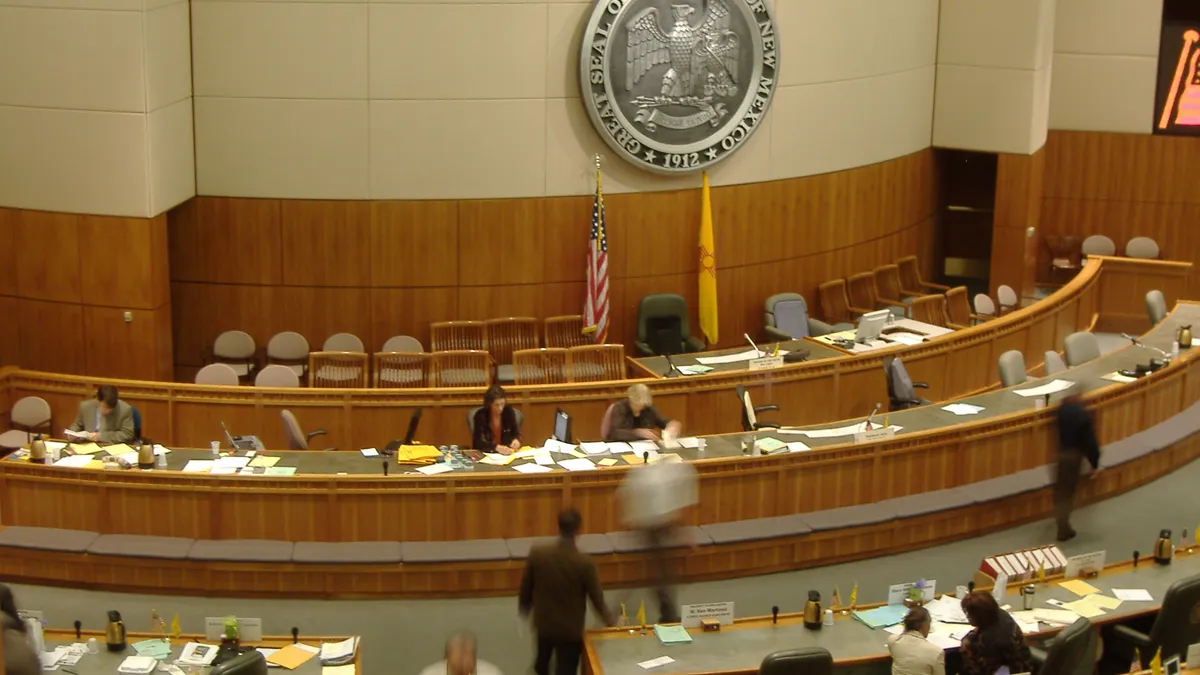Dive Brief:
- The New Mexico State House on Tuesday passed Senate Bill 489 44-22, requiring the state to generate 100% of its electricity from carbon-free resources by 2045.
- The Energy Transition Act, introduced in February and approved by the State Senate last week, also increases the state's renewable portfolio standard (RPS) to 50% by 2030 and 80% by 2040, echoing Democratic Gov. Michelle Lujan Grisham's campaign promises. It also includes securitization provisions to help recover the costs of coal plant retirements and allocates funds toward transitioning mining communities.
- The bill follows Grisham's January executive order, which committed the state to the U.S. goals under the Paris Climate Agreement — reducing carbon emissions by at least 45% below 2005 levels by 2030. She is expected to sign the bill soon.
Dive Insight:
The bill marks another leap in the state's energy transition. New Mexico has been a fossil fuel-reliant state for years — at the end of 2018, it generated about 30% of its electric power from natural gas and about 50% from coal.
Its largest utility, Public Service Company of New Mexico (PNM), in December, received approval for its integrated resource plan, which would phase out coal-fired generation entirely by 2031.
The carbon-free route chosen by the state could leave the door open for carbon capture technology paired with fossil fuel plants, but the state rejected a bill earlier this month that would have amended the Energy Transition Act to include a carbon capture and sequestration trial study, another effort to prolong the life of the coal-fired San Juan Generating Station.
The bill approved Tuesday also includes a provision on replacement power for coal and natural gas plants, keeping in mind environmental and economic impact.
"In determining whether to approve replacement resources, the commission shall prefer resources with the least environmental impacts, those with higher ratios of capital costs to fuel costs and those able to reduce the cost of reclamation and use for lands previously mined within the county of the qualifying generating facility," the bill says.
New Mexico joins California and Hawaii as the third state to pass a 100% carbon-free requirement. Washington, D.C. passed a 100% renewables by 2032 bill in December and states like Minnesota, Washington, New York and Illinois have introduced similar legislation.
"This legislation launches New Mexico to the forefront of clean energy in the United States with new renewable energy, making our state completely carbon-free by 2045," said Speaker of the House Brian Egolf, who co-sponsored the bill, in an emailed statement. "My office has spent 14 months working with groups across the state to make sure we are doing this right."
New Mexico has become a clean energy leader since the blue wave of gubernatorial and legislative victories last fall, which some say is evidence of growing support for renewables and a concern for climate change across the country.
Former Republican Gov. Susana Martinez's eight years in office were "marked by inaction and rollbacks on a lot of clean energy issues," including exiting the Western Climate Initiative and halting the promotion of renewable energy, Jon Goldstein, director of energy regulatory & legislative affairs at the Environmental Defense Fund, told Utility Dive after the midterm elections.
"New Mexico is different in that [over] the last eight years, nothing has happened in the clean energy and climate space except for rollbacks and delay," Noah Long, director of the Interior West and Northwest Climate and Clean Energy Program at the Natural Resources Defense Council, told Utility Dive earlier this year. "The great need and also the pace with which the government is meeting that need is pretty remarkable."















